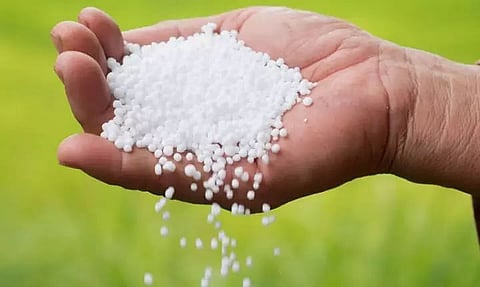
- Home
- Live Blog
- Breaking News
- Top Headlines
- Cities
- NE News
- Sentinel Media
- Sports
- Education
- Jobs

STAFF REPORTER
GUWAHATI: State Agriculture Department has admitted that some fertilizer-supplying companies are putting pressure on it to lift the ban on the inter-district movement of fertilizers, especially urea and DAP (Di-ammonium phosphate) in the state.
The blanket ban on the inter-district movement of fertilizers is an effective instrument to stop rampant irregularities in the sales and distribution of fertilizers in the state. Inter-district movement of fertilizers leads to artificial scarcity, rise in prices, hoardings etc that make farmers badly feel the pinch.
Irregularities in the distribution of fertilizers in the state have been age-old. The menace has become complicated due to the lack of a clear-cut fertilizer distribution policy of the Agriculture Department. On February 3, 2022, the department issued an order allowing inter-district movement of fertilizers in districts that have tea gardens. The department did not allow inter-district movement of fertilizers for farmers.
Two days later, i.e. on February 5, 2022, the department issued another order suspending the earlier order and directed the district agriculture officers (DAOs) not to permit any inter-district movement of urea and DAP. It said that it would issue a rake-point mapping order tea gardens separately in due course. However, the order is yet to come.
Meanwhile, a lobby of fertilizer companies has been putting pressure on the department to withdraw the ban on inter-district movement of fertilizers.
When asked about this vexed issue, the Principal Secretary of Agriculture, Ashish Kumar Bhutani, said, "A group is putting pressure on us to lift the restriction on the inter-district movement of fertilizers in the state. We have not taken any decision as yet. We will decide the matter after discussion with the government."
Bhutani also admitted that irregularities were taking place in the distribution and sales of fertilizers in some areas. "We are trying to streamline the fertilizer distribution system. We will discuss the problems with the stakeholders. We will issue the final roadmap after discussing the matter with the government," he said.
According to official records, the state has four fertilizer distribution zones comprising groups of districts. Each zone has a particular urea-supplying company to place rakes at the mapped rake points.
BVFCL has got Lakhimpur, Dhemaji, Majuli, Tinsukia, Dibrugarh, Sonitpur, Biswanath, Udalguri, Sivasagar, Charaideo and Jorhat districts. And its rake points are at Dikom, Jorhat, Haarmuti, North Lakhimpur, Lakowa, Dekargaon, Tinsukia and Gogamukh.
Indian Patash Ltd's district map contains Karimganj, Hailakandi, Kamrup, Darrang, Nalbari and Cachar. Its rake points are at Salchapra, Bhaihata, Changsari, Rangia and Bhanga.
IFFCO has Baksa, Barpeta, Bajali, Bongaigaon, Chirang, Kokrajhar, Dhubri, South Salmara and Goalpara districts. Its rake points are at Barpeta Road, Bongaigaon, Fakirgram, Jogighopa and Gossaigaon.
National Fertilizer Ltd has Golaghat, Karbi Angling, Morigaon, Kamrup (M), Nagaon, Hojai, and Dima Hasao. Its rake points are Furkating, Jagiroad, Haiborgaon and Hojai.
The order specifically mentioned that the companies should adhere to their mapped districts and rakes and they should not bring fertilizers outside their zones. If they have to go beyond the mapped districts, they need approval from the Directorate of Agriculture.
The order further said that 'the district agriculture officers shall ensure that the names of all beneficiaries/tea gardens/small tea growers who have received urea from dealers in the districts are uploaded in the district portal mandatorily without which next allocation shall not be made to any wholesaler or retailer".
Fertilizer wholesalers/retailers and sometimes sub-retailers opt to sell at higher prices at places where the demand is high, depriving genuine farmers. Some of them also hoard fertilizers and create artificial scarcity. DAOs are to monitor all these irregularities daily. Had they monitored fertilizer distribution regularly, the situation would not have come to such a pass now. Nexus comprising a section of officials, fertilizer companies, wholesalers and retailers is out to make the farmers of the state pay through their nose.
Also watch: